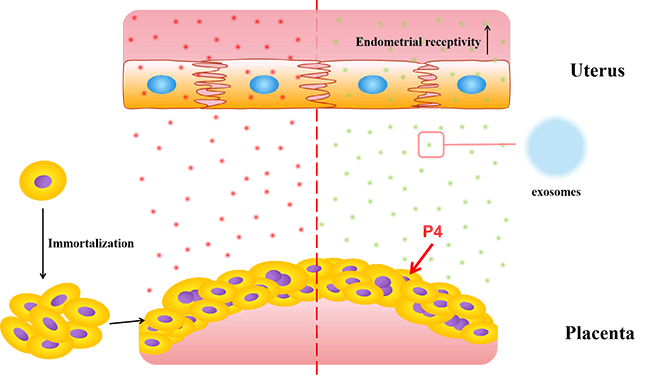- 著者
- Yue SU Qianru LI Qiaochu ZHANG Zhiming LI Xinxin YAO Yong GUO Longfei XIAO Xiangguo WANG Hemin NI
- 出版者
- The Society for Reproduction and Development
- 雑誌
- Journal of Reproduction and Development (ISSN:09168818)
- 巻号頁・発行日
- pp.2021-077, (Released:2021-10-22)
- 被引用文献数
- 11
Inadequate fetomaternal interactions could directly lead to pregnancy failure in dairy cows. Exosomes are widely involved in endometrial matrix remodeling, immune function changes, placental development, and other processes of embryo implantation and pregnancy in dairy cows. However, the role of exosomes derived from placental trophoblast cells in regulating the receptivity of endometrial cells and facilitating fetomaternal interaction remains unclear. In this study, bovine trophoblast cells (BTCs) were obtained from bovine placenta and immortalized by transfection with telomerase reverse transcriptase (TERT). Immortalized BTCs still possess the basic and key properties of primary BTCs without exhibiting any neoplastic transformation signs. Subsequently, the effect of trophoblast-derived exosomes (TDEs) on endometrial receptivity in endometrial epithelial cells (EECs) was determined, and the mechanism whereby TDEs and their proteins participate in the fetomaternal interaction during bovine pregnancy were explored. EECs were co-cultured with the exosomes derived from BTCs treated with progesterone (P4). Such treatment enhanced the expression of the endometrial receptivity factors, integrin αv, β3, Wnt7a, and MUC1 by changing the extracellular environment, metabolism, and redox balance in EECs via proteome alignment, compared with no treatment according to the DIA quantitation analysis. Our study demonstrated that trophoblast-derived exosome proteins are one of the most critical elements in fetomaternal interaction, and their changes may act as a key signal in altering endometrial receptivity and provide a potential target for improving fertility.
